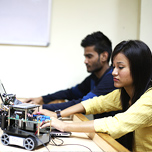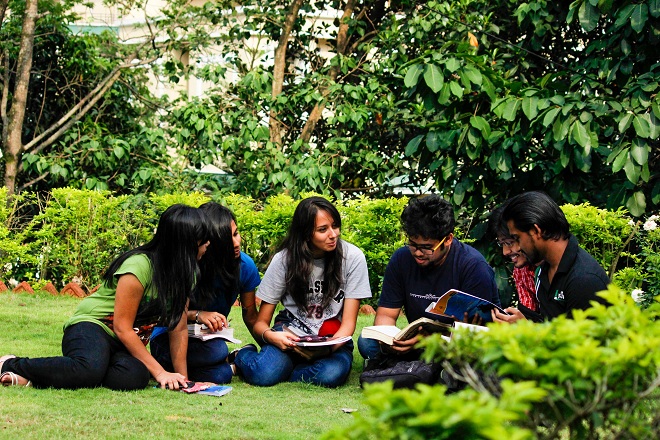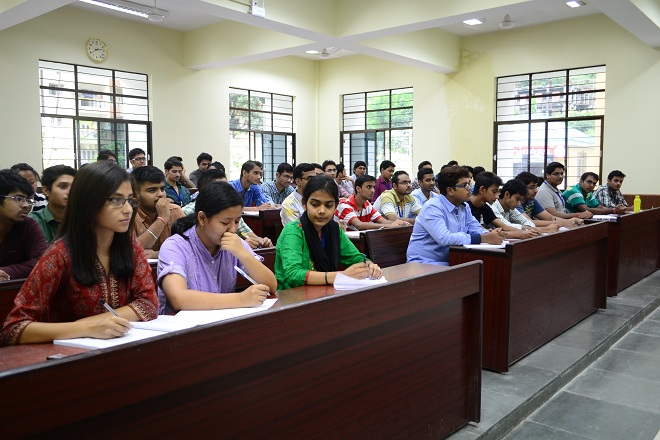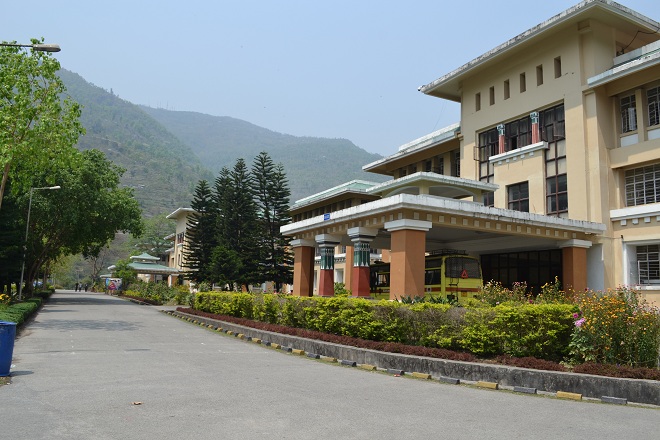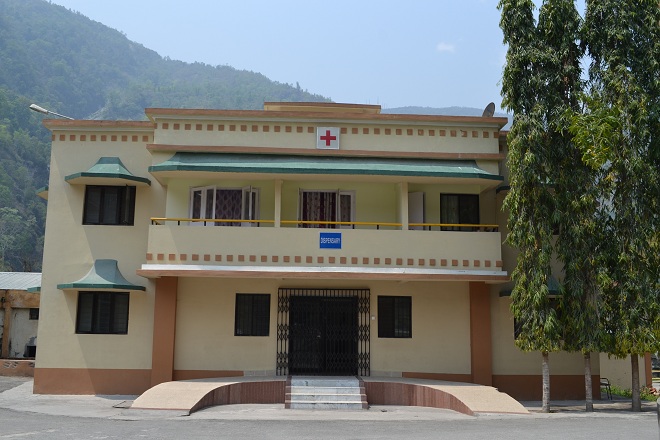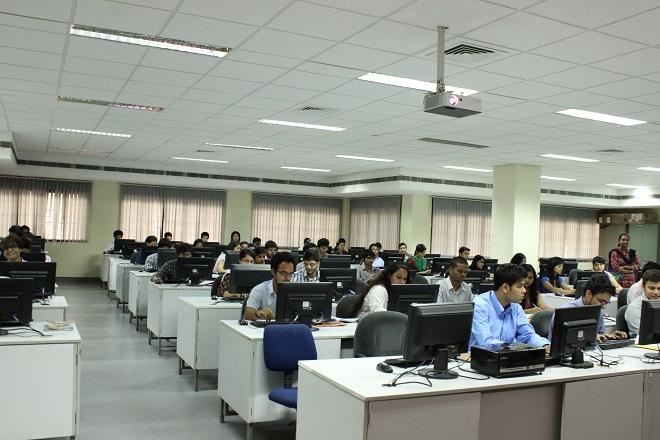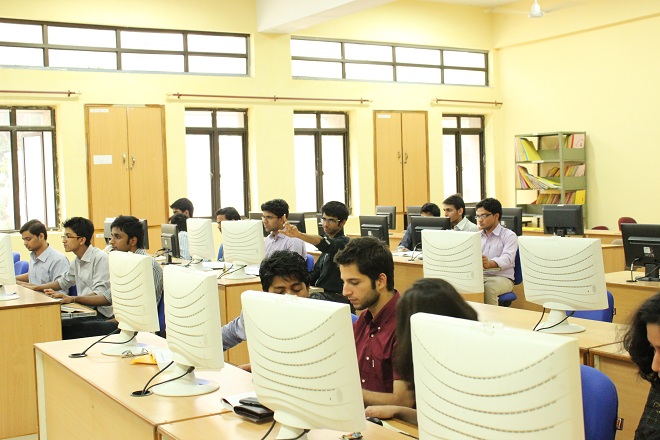OVERVIEW
Established in the year 1999, the department of Information Technology equips the students with practical-based knowledge modelled upon developments in software technology and its application in relevant fields like AI, Computer Vision, Soft Computing etc. Since its inception, it has grown to be a centre for excellence, innovation and research with dedicated faculty & staff, highly motivated students, state-of-the-art facilities, and an innovative teaching-learning environment. The department offers one undergraduate programme - B.Tech.(IT) and one post-graduate programme MTech (IT). Ph.D programme is also offered by the department. The department is accredited by National Board of Accreditation (NBA) in the year 2022 for 3 years. Our students have consistently achieved excellent placements year after year and have demonstrated a high level of success at pursuing post-graduate and doctoral studies at leading universities world-wide. The Department of Information Technology is active in research and development dealing with cutting edge technologies. The department conducts research in some of the key areas like Computer Networks, Computer Vision and Artificial Intelligence, Image Processing, Deep Learning, Data Mining, Embedded System, Natural Language Processing, Wireless Communication, Internet of Things, Information Security Systems.
PROGRAM OUTCOME (PO)
- Engineering knowledge: Apply the knowledge of mathematics, science, engineering fundamentals, and an engineering specialization to the solution of complex engineering problems.
- Problem analysis: Identify, formulate, review research literature, and analyze complex engineering problems reaching substantiated conclusions using first principles of mathematics, natural sciences, and engineering sciences.
- Design/development of solutions: Design solutions for complex engineering problems and design system components or processes that meet the specified needs with appropriate consideration for the public health and safety, and the cultural, societal, and environmental considerations.
- Conduct investigations of complex problems: Use research-based knowledge and research methods including design of experiments, analysis and interpretation of data, and synthesis of the information to provide valid conclusions.
- Modern tool usage: Create, select, and apply appropriate techniques, resources, and modern engineering and IT tools including prediction and modeling to complex engineering activities with an understanding of the limitations.
- The engineer and society: Apply reasoning informed by the contextual knowledge to assess societal, health, safety, legal and cultural issues and the consequent responsibilities relevant to the professional engineering practice.
- Environment and sustainability: Understand the impact of the professional engineering solutions in societal and environmental contexts, and demonstrate the knowledge of, and need for sustainable development.
- Ethics: Apply ethical principles and commit to professional ethics and responsibilities and norms of the engineering practice.
- Individual and team work: Function effectively as an individual, and as a member or leader in diverse teams, and in multidisciplinary settings.
- Communication: Communicate effectively on complex engineering activities with the engineering community and with society at large, such as, being able to comprehend and write effective reports and design documentation, make effective presentations, and give and receive clear instructions.
- Project management and finance: Demonstrate knowledge and understanding of the engineering and management principles and apply these to one’s own work, as a member and leader in a team, to manage projects and in multidisciplinary environments.
- Life-long learning: Recognize the need for, and have the preparation and ability to engage in independent and life-long learning in the broadest context of technological change.
PROGRAM SPECIFIC OUTCOME (PSO)
- Students will be equipped with skills and competency to work and deliver quality results in industries, research organizations and in the professional world as a whole.
- Students will be competent to develop soft ware solutions for different relevant problems in the world of Information and Communication, by applying knowledge of various domains such as Database Technologies, Information Systems, Network Technologies, Cloud Technologies, Algorithms, Artificial Intelligence, Machine Learning, Cyber Security, Image Processing and associated Interdisciplinary Subjects.
COURSE OUTCOMES
COURSE SYLLABUS
Career Opportunities
The rigorous training that the students undergo makes them worthy professionals with mental agility and technical skill sets sought after by the IT Industry. No wonder, the students of Information Technology get the oppourtunity to obtain number of on-campus placement offers and our glittering alumni are working with organizations like Microsoft, Amazon, Google, Oracle, Dell, IBM, ANZ, JP Morgan Chase, CISCO, eBay, American Express to name a few.
ELIGIBILITY
- B.Tech. - Passed 10+2/equivalent with 45% marks (40% in Reserved Category) in Physics & Maths (Mandatory) and any one from the following: Computer Science / Electronics / Information Technology / Biology / Chemistry /Informatics Practices / Biotechnology / Technical Vocational subject / Engineering Graphics / Business Studies / Entrepreneurship."Graphics / Business Studies / Entrepreneurship.
- B.Tech. [L.E.] - Passed Diploma in any branch in Engineering and Technology with at least 45% marks (40% in Reserved Category) OR BSc with at least 45% marks (40% in Reserved Category) and passed 10+2 exam with Mathematics as a subject OR passed D.Voc stream in the same or allied sector.
ENTRANCE EXAMINATION
a) General Category, Defence, North East, Gorkha Territorial Administration (GTA) and Paramilitary Force Categories:
- The candidates will have to appear for the JEE to be conducted by the CBSE.
- Cut-off JEE Main Score in All India JEE applicable to all reserved categories will be displayed on our website www.smu.edu.in.
b) Sikkim Category:
- Candidates should apply to the Director, Technical Education, HRDD and Government of Sikkim. They should appear in the entrance test conducted by the Government, the details of which will be notified by the Director, HRDD, Technical Education.
c) MU-OET Category:
- Manipal University Online Entrance Test (MU-OET) 2017
d) SMIT Online Test:
- Candidates seeking admission under this category will have to appear for online test conducted by SMU.














